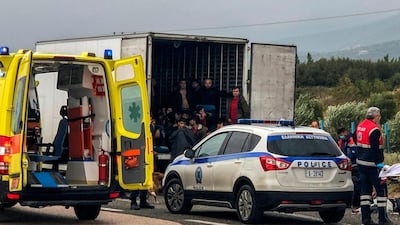Germany’s federal police force said on Monday that 11 migrants were found alive in a refrigerated truck at a service station in Bavaria, in the south-east of the country.
Police said that the migrants were all from Afghanistan and were aged between 14 and 31.
The 11 people are understood to have boarded the Turkish truck when it was loaded with fruit in Serbia, according to news agency dpa.
The migrants were found on Saturday by authorities after the driver of the truck heard knocking noises from the vehicle at a highway rest area near Passau, close to the Austrian border. Authorities said the passengers were suffering headaches and breathing problems in the back of the vehicle.
Police said that the driver of the truck assured them that he had not known about the passengers. The lorry was bound for Belgium.
There have been a number of instances in recent months were migrants have been found stowed away in trucks crossing Europe.
In early November, 41 migrants were found alive in a refrigerated truck on a highway in northern Greece.
The month before, 39 Vietnamese migrants were found dead at the back of a refrigerated truck in Essex, south-east England.
The incident prompted an outpouring of grief in Vietnam and a political response in the UK.
Home Secretary Priti Patel said she was "shocked and saddened by this utterly tragic incident," and announced that additional UK Border Force personnel were to be deployed to the Belgian border port of Zeebrugge to prevent a repeat of the tragedy.
The deaths were a grim reminder of one of the darkest episodes of the 2015 migrant crisis in Europe, when 71 people were found suffocated in a refrigerated lorry container in 2015.
A baby girl, thought to be less than a year old, was among the bodies of men, women and children from Syria, Iraq and Afghanistan.
They had already been dead for two days by the time they were discovered by Austrian police.
The incident was met with international revulsion and prompted countries along the Balkan migratory route to close their borders to refugees.
But migration along the dangerous overland route across Europe continues, and at the end of 2018, more than 107,900 migrant arrivals to Europe were registered by sea and overland, compared to 172,300 in 2017.

